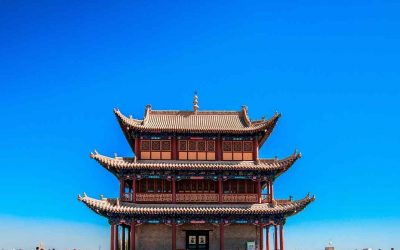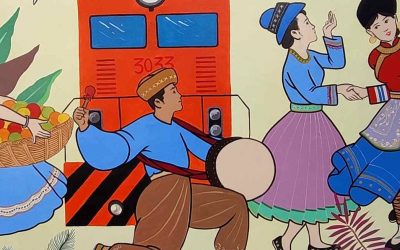The Lost Mythology of Ancient China
Reconstructing the mythology of ancient China is a painstaking task that tries to characterize some legendary figures and situations based only on the few sentences about them found in later works by philosophers and historians. The Classic of Mountains and Seas (Shanhaijing) helps to fill in some gaps, but its cryptic descriptions make it useful mainly for a small number of specialists.
A Lost Book
Much more useful is the Shiben, often translated as the Book of Origins, an ancient Chinese historical and genealogical text dating back approximately to the Warring States period (5th–3rd centuries BCE). The only problem is that the last known copy was lost during the Song dynasty, around 1,000 years ago. What would have been an irreparable loss in another culture has been partially recovered, thanks to China’s scholarly tradition. Over the past centuries, several scholars have attempted to reconstruct it based on references made in other texts that quote or cite it.
Contents of the Shiben
The Shiben is essential for understanding early Chinese history and especially how the ancient Chinese viewed their mythical and cultural origins — including royal genealogies, the beginnings of institutions, and legendary inventions. Among its main sections were the genealogies of kings and royal families, the origins of important feudal states and geographical places, and chronological lists of rulers with approximate dates or time periods.
It integrated legends and events that may have occurred in the distant past into a coherent narrative about the development of Chinese civilization. These reconstructions make the Shiben a key source for studying the historical and mythological worldview of ancient China.
Inventions from the Dawn of China
One of its most fascinating sections deals with the origins of professions, inventions, and techniques, attributing various aspects of cultural progress to their respective mythical inventors. Regardless of whether these claims hold historical accuracy, they are essential knowledge for anyone approaching Chinese culture. For example:
– Cang Jie, a minister of the Yellow Emperor, created Chinese characters by observing the tracks left by birds and animals. Legend says that when he finished, wheat rained down from the sky and spirits wept, because knowledge had entered the world — bringing both power and danger.
– Meng Tian, ignoring chronological consistency, was a general of the Qin dynasty who is credited with perfecting the Chinese brush and the use of ink made from vegetable carbon.
– Shen Nong, or the «Divine Farmer», taught humanity to cultivate grains, use plows, and identify medicinal plants. He is considered the father of agriculture and traditional Chinese medicine.
– Shaohao was the one who began domesticating animals for fieldwork and human service.
– You Chao Shi, meaning “He of the Nest”, had the idea of building elevated houses to protect people from wild animals and natural elements — a crucial step toward a sedentary lifestyle.
– Leizu, wife of the Yellow Emperor, is credited with discovering sericulture after observing silkworms making cocoons on mulberry leaves.
– Fu Xi, among other inventions, is attributed with creating fishing nets and the system of trigrams that later evolved into the I Ching (Yijing).
– Ling Lun, a musician of the Yellow Emperor, is said to have created the first Chinese musical scales based on bird songs.
– Gao Yao, a justice minister under Emperors Yao and Shun, laid the foundations of Chinese penal law and used a mythical unicorn (xiezhi) to detect lies and resolve disputes.
– Xi Zhong is credited with inventing wheeled carts — a major improvement in land transportation.
About me: I have spent 30 years in China, much of the time traveling and studying this country’s culture. My most popular research focuses on Chinese characters (Chinese Characters: An Easy Learning Method Based on Their Etymology and Evolution), Matriarchy in China (there is a book with this title), and minority cultures (The Naxi of Southwest China). In my travels, I have specialized in Yunnan, Tibet, the Silk Road, and other lesser-known places. Feel free to write to me if you’re planning a trip to China. The agency I collaborate with offers excellent service at an unbeatable price. You’ll find my email below.
Last posts
Cold Steel – A Sniper’s War
Cold Steel - A Sniper's War If in the West war films are a genre in their own right, in China they are an even more important genre, and that is because there is always an interest on the part of the official media to remember the two great war events that gave rise...
A Woman, a Gun and a Noodle Shop
A Woman, a Gun and a Noodle Shop Directed by Zhang Yimou: 2009. 85. Min. A Woman and a Gun and a Chinese Noodle House is a quite singular work within Zhang Yimou's filmography. His light-hearted style starts from the first scenes, in which we see the protagonist with...
Jiayuguan Pass – the Great Wall on the Silk Road
Jiayuguan Pass - the Great Wall on the Silk Road Jiayuguan Pass or Jiayu Pass, as guan means pass in Chinese is one of the most remarkable monuments on the Silk Road and one of its most popular sights. Built at the end of the Great Wall, showing the desolation of the...
Springtime in a Small Town: The best film in China’s history
Springtime in a Small Town: The best film in China's history All the rankings made in recent years, place a film, unknown to the general public, as the best film in China. It is called "Springtime in a Small Town" and was directed by Fei Mu in 1948. I had been wanting...
The Character and Function of Music in Chinese Culture
The Character and Function of Music in Chinese Culture In 1946 Bliss Wiant finished his Doctoral dissertation . The subject was “The character and function of Music in Chinese culture.” Some of his reflections are so interesting that I share with readers here some...
History of Dunhuang, crossroads of cultures on the Silk Road
History of Dunhuang, crossroads of cultures on the Silk Road Dunhuang is one of the most fascinating cities on the Silk Road, although it now appears to be asleep, in the sleep that the improvement of communications in recent centuries has brought to the great...










